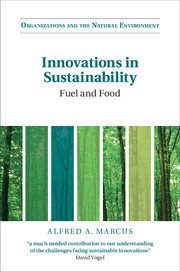Book contents
- Frontmatter
- Dedication
- Contents
- List of figure and tables
- Foreword
- Acknowledgments
- Introduction the path to sustainability
- Part I Funding sustainable startups
- Part II Business models
- Part III The macroenvironment and industry context
- Part IV Finding customers
- Part V Competition between mission and non-mission based businesses
- Concluding observations: the journey continues
- Index
Foreword
Published online by Cambridge University Press: 05 August 2015
- Frontmatter
- Dedication
- Contents
- List of figure and tables
- Foreword
- Acknowledgments
- Introduction the path to sustainability
- Part I Funding sustainable startups
- Part II Business models
- Part III The macroenvironment and industry context
- Part IV Finding customers
- Part V Competition between mission and non-mission based businesses
- Concluding observations: the journey continues
- Index
Summary
The relationship between business and the environment has become extremely popular. Amazon lists 22,500 books under the heading “sustainable management” and 80,000 titles under “environmental management.” There are of course many reasons why so many books on these topics are being published. One is that many firms are finding themselves under substantial pressures from government, consumers, employees, and the general public to improve their environmental performance. They want and need guidance as to how to accomplish this – information that such books provide.
A second reason is that a growing number of executives and investors have become persuaded that there are substantial business opportunities associated with becoming more sustainable. The very term “sustainable management” represents an effort to link improved environmental performance with long-term growth and profitability. Thus a “sustainable company” is one that has successfully managed its long-term ecological impact in a way that also assures its future financial viability, with the two goals reinforcing one another.
The claim that becoming “greener” can make a firm more profitable dominates writing on sustainable management. What makes this claim credible is that many firms have financially benefited by becoming more sustainable. As this book demonstrates, venture capital firms have prospered by investing in clean energy, investments in solar and wind power have proven profitable, there is a market for more fuel-efficient vehicles and other environmentally friendly consumer products, and many consumers want to purchase healthier food.
- Type
- Chapter
- Information
- Innovations in SustainabilityFuel and Food, pp. xii - xivPublisher: Cambridge University PressPrint publication year: 2015

